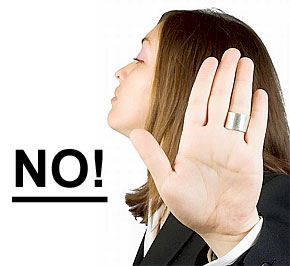Do you want to find more happiness? 
If you are a “Yes” person that struggles with setting limits, learning to say “No!” may be a good place to start. If you say “yes” even when you don’t want to, or often feel like “no” isn’t an option, you may be running yourself into an exhausted and depressed state.
The sad truth is that women are greatly encouraged to please others, especially men, at the expense of themselves. It may even be emphasized religiously, that to be pious and pure is to be completely “selfless”–often translated into tricking oneself into believing you have no needs and acting like a doormat.
I’m not saying that selfless acts should be eliminated. However, not including yourself in the needs that are considered can be a very harmful act against yourself, and can set you up in a long-term pattern of being treated badly, as well as your own inner hurt, anger, and resentment.
It may be so confusing why others, men especially, treat you with disrespect. You are being good, kind, going the extra mile, doing all the things you were taught to be the best person you can be. So why aren’t others seeing your value?
Well, the simplest answer is that you aren’t seeing it yourself. You are not acting as if your feelings or needs deserve to be considered, and so you are unknowingly giving other people, especially men who are competitive, the message that you come at a very low to no price. Hence, you aren’t seen as valuable. Call it crazy, but it’s human nature. Say no to constantly doing something for nothing, stop wearing yourself thin and always bending over backwards, have some opinions and needs of your own to push up against, and your respect factor and personal happiness will rise instantly.
 Unfortunately your “no” muscle is weak. On some level, you truly believe that saying no is going to hurt you or someone else. Perhaps you were yelled at, punished, or hurt in some way when you tried to assert yourself, or had a difference in interests or opinions than the people around you. The negative consequences fused the experience of “no!” with hurt, or the idea that “I am a bad person.”
Unfortunately your “no” muscle is weak. On some level, you truly believe that saying no is going to hurt you or someone else. Perhaps you were yelled at, punished, or hurt in some way when you tried to assert yourself, or had a difference in interests or opinions than the people around you. The negative consequences fused the experience of “no!” with hurt, or the idea that “I am a bad person.”
This part is not your fault. You came by it innocently. Your unconscious has a way to protect and defend you to insure your survival, and if saying no endangered yourself or your relationships, then your unconscious may have decided that it just wasn’t worth the risk.
But where are you now? Are you still trying to innocently be as good and pleasing as possible, only to be left feeling hurt, used, betrayed, unloved, unappreciated? Are you silent wondering if you matter, waiting for other people to notice your needs and assert them for you?
In order to heal from this bind that you are in, you need to take the reigns of your own life. You need to practice assertion (different than aggression), and practice saying “No!” over and over again until it feels natural, self-affirming, and positive. That’s right, positive. When you say no, you are not only standing up for you needs and protecting your boundaries, you are giving others a guide to understanding your limits and treating you with the respect you deserve.
If you have worked hard all of your life to be a good person, and tried to be pleasing and sweet, putting some limits on what you will and will not do will not suddenly cancel out the caring person you already are. Defining limits and healing the wound of hurt will actually give you more energy to care because you will be happier and not drained. Your resentment will disappear, and most of all, you will like and respect yourself.
If you are in a position where you want to say no but can’t seem to actually do it, you most likely have a traumatic emotional injury that needs time, attention, and care from a dedicated professional. Compassion with yourself is an important first step. It’s very important that you learn to love yourself in the ways you have always longed to be loved. Your inner child needs you, and, you are not alone. Help is available.
Love, sex addictions, and food addictions are just as real as drug and alcohol addictions, but may go unnoticed for your whole life. You may feel caught in a pain cycle again and again, and not know how to get out. Support from others that have gone through the healing process can be an essential part in your own healing journey.
If you think that you may be suffering from this type of wound, don’t hesitate to reach out for help. Healing is possible, and relief can happen sooner than you think. I would love to speak with you about finding the support you need, and matching you with the most appropriate resources. Contact me to find out more about how counseling, EMDR, and somatic therapy can work for you.
–Copyright © 2015 Jennifer Norstrom, LMFT

